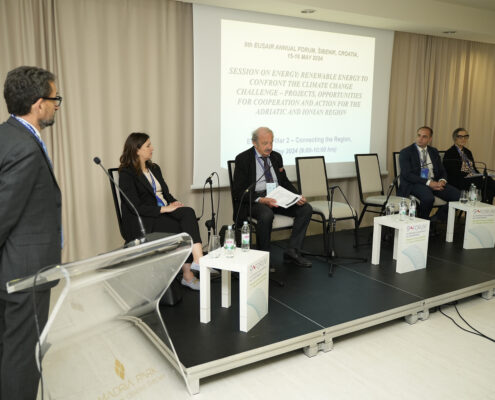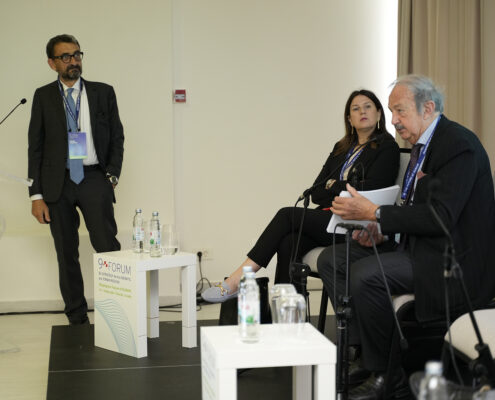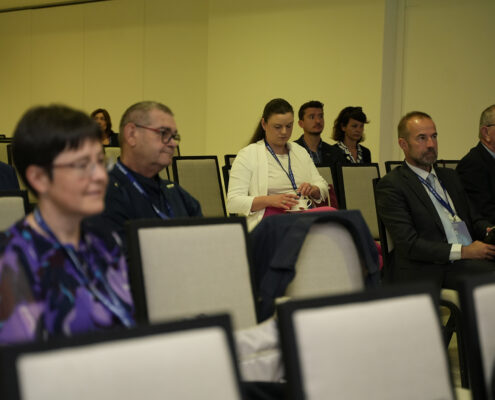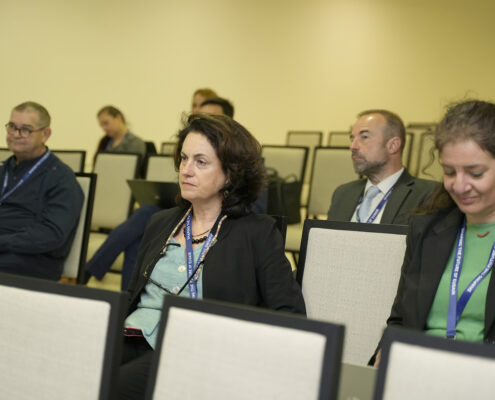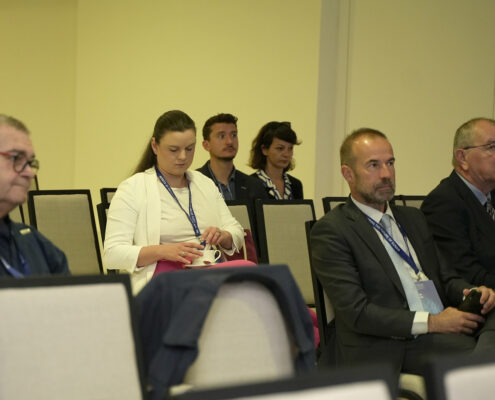9th Annual EUSAIR Forum
Šibenik, Croatia | 15 - 16 May 2024CONCLUSIONS OF THE PILLAR 2 SESSION - Energy
Pillar 2 Connecting the Region (Energy subgroup)
During the 9th EUSAIR Forum (Šibenik, Croatia), in the framework of Pillar 2 Energy sub-group, on the 16th May it was held the thematic session: Renewable Energy to Confront the Climate Change Challenge - Projects, Opportunities for Cooperation and Action for the Adriatic and Ionian Region, focused on the transition towards decarbonised energy systems to confront the global climate change challenge. The session was chaired and moderated by Mr. Sergio Garribba, EUSAIR Pillar 2 Coordinator.
Mr. Garribba addressed the discussion recalling that renewable energy is a new chapter for EUSAIR together with green energy and stressing the importance to discuss the actions which will be the future of EUSAIR accelerating the commitment to the decarbonisation and new possible solutions for energy efficiency in accordance with European Green Deal.
Four panellists together with the public contributed to the interactive session around renewable energies actions in the future with Q&A time after each speech.
- Davide Tabarelli (Italy), President of Nomisma Energia, gave the keynote address focused on Renewable Energy Sources (RES) to confront the Climate Change Challenge through the Adriatic and Ionian Region, with a focus on projects, challenges and opportunities for cooperation and action for the AI region.
The presentation included main data on the Macroregion Scenarios by 2030 and by 2050 on reduction of final energy consumptions, on natural gas replaced by RES, on rise of Electricity generation by RES and marginal from nuclear, and also on coal power generation expected to fall.
Moreover, the presentation included an overview on electricity networks, power grids projects, natural gas networks and projects, main challenges and opportunities in the area. Finally, considering decarbonization and security as achievable targets despite the differences and delays among EUSAIR countries, some recommendations and possible options were given and included in the conclusion of the Pillar Coordinator.
- Peđa Bulić (Serbia), Managing Director of South-East Europe Consultants, stressed the importance of energy security and stability explaining how the regulations and production of parts for interconnection are affecting the investments.
- Noemi Magnanini (Italy), Senior officer of Managing Agency of the Energy System (GSE SpA), highlighted the Italian investments and GSE activities to promote renewable energy and security in the AI Region.
- Francesca Orazi (Italy), Coordinator of STEP project, presented the EUSAIR Stakeholder Platform as a tool operating to engage and gather stakeholders as energy users, consumers and communities, giving them the chance to interact.
In conclusion, Mr. Garribba remarked that efforts to deepen or expand Renewable Energy Sources (RES) through the AI Region should be accompanied by actions aimed at preventing major energy and economic imbalances. Therefore, it would be a priority to have a EUSAIR RES Road Map. In this regards, energy structural transformations, the transition towards decarbonised energy systems, the digital transition and large-scale deployment of RES should contribute to overcome old and new territorial divergences. RES and energy communities may represent an innovative means and drivers.
Moreover, Mr. Garribba underlined it is necessary to increase public awareness and social support by involving new stakeholders. In this context, EUSAIR Countries may wish to benefit from exchanging and adopting successful experiences, such as the one represented by the Agency for the Management of the Energy System (GSE) in Italy. Production, deployment and delivery of RES are requiring the participation and involvement of a large number of diverse players or actors given the new distributed and interactive energy systems which are entailed. It is assumed that the EUSAIR Stakeholders Platform could represent a useful instrument to improve the new energy system and strengthen the connection between users and producers of renewable energy.
Finally, Mr. Garribba remarked the relevance of foreseeing the new updated Master Plan on Energy Policies and Programmes for the AI Region to include and consider the dynamic energy context and how to confront climate change and other priorities, since RES will play an increasing key role in the expected decarbonisation process of the energy systems through the AI Region.
.





